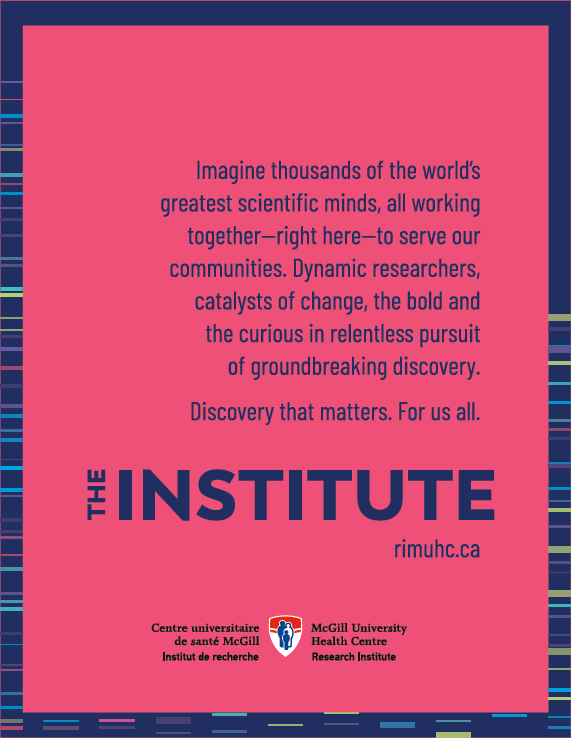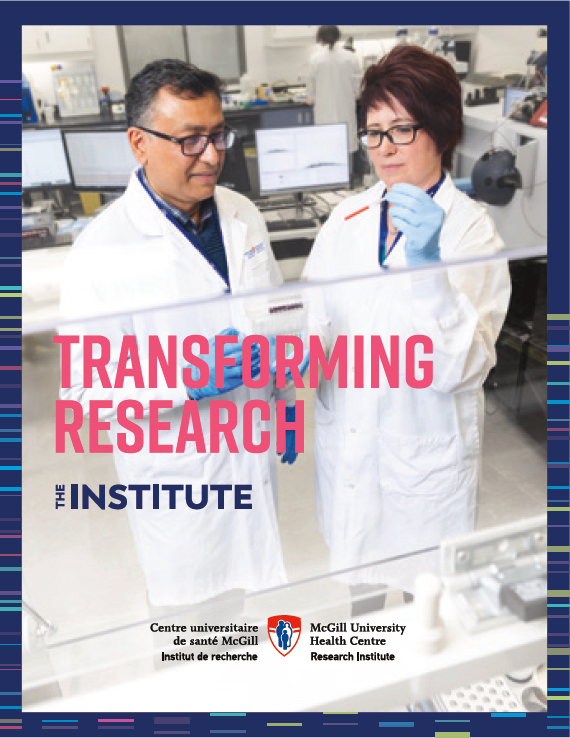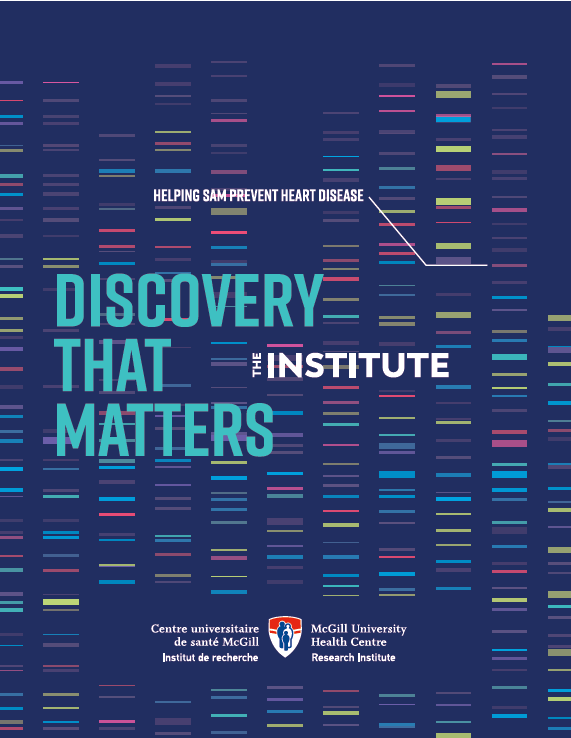The Research Institute of the McGill University Health Centre unveils bold new 2030 Vision, advancing precision health throughout the life course
The rollout of a renewed visual identity and a landmark event mark the beginning of this transformative journey for The Institute.
The Research Institute of the McGill University Health Centre (The Institute) launches today its transformative 2030 Vision, “Precision Health Throughout the Life Course,” a pioneering initiative that aims to reshape healthcare research through personalized, data-driven approaches that consider the unique needs of individuals at every stage of life. This ambitious strategic vision, developed through a comprehensive internal and external consultation process and supported by a fresh new visual identity, underscores The Institute’s commitment to advancing scientific research and creating healthcare solutions that are proactive, precise and patient-centred.

“Today’s launch marks a new era for The Institute. With our 2030 Vision, we are making an unwavering commitment to deliver clinical impact through interdisciplinary science. This vision is about precision health, ensuring that patients benefit from tailored health solutions informed by the latest scientific advances. It echoes the timeless insight of Hippocrates: ‘Every person is different, and this affects both the prediction and treatment of disease,’” says Rhian Touyz, MBBCh, Ph.D., Executive Director and Chief Scientific Officer of The Institute.
Strategic priorities for the future
The 2030 Vision focuses on several key areas to advance precision health research, defined as a modern approach to medicine that tailors the way we prevent, diagnose and treat diseases based on each patient’s unique characteristics.
The plan stems from two guiding principles—transversal collaborations and patient-oriented research—to unlock impactful discoveries and enable research outcomes that support greater improvements to the well-being of patients and the population. It outlines five transformative research priorities, which are built upon four enabling priorities meant to serve as an operational foundation and to facilitate research success.
Specifically, as it continues to expand fundamental research to understand health and disease, The Institute will integrate new data-driven approaches and harness technological advances to improve diagnosis, treatment and prevention. It will also advance clinical trials through novel methods and work to reduce health disparities.
As it moves towards implementing its new vision, The Institute will enhance its capabilities, tools and technology platforms, while fostering interdisciplinary collaborations, research networks and partnerships. It will maintain an outstanding, inclusive and diverse work environment for its scientists, trainees and staff—who form the very foundation of its identity and success.
This vision is the result of a collaborative strategic planning effort initiated in 2022, involving The Institute’s internal community through extensive consultations, town halls and feedback sessions. A dedicated task force, representing the diverse interests within The Institute, played a pivotal role in this process. Additionally, The Institute benefited greatly from the invaluable expertise of the visionary international researchers on its External Scientific Advisory Board.
Refreshed visual identity to reflect the 2030 Vision
The launch of the 2030 Vision culminates in the unveiling of a refreshed visual identity for The Institute—a new designation chosen to increase awareness of one of the main research powerhouses in the country, with more than 700 researchers and 1,300 research trainees, graduate students, postdocs and clinical research fellows. Indeed, according to the Canada Top 40 Research Hospitals survey by Research Infosource Inc., The Institute is currently number 3 in Canada in terms of overall research spending and number 1 in Quebec both in terms of overall research spending—far ahead of Quebec’s three other university hospitals—and research intensity per researcher.

The new look, which is visible across the research block of the McGill University Health Centre’s Glen site, reflects The Institute’s dynamic and patient-centred approach to healthcare innovation, and embodies the transformative spirit of the 2030 Vision. Gradually deployed across The Institute’s external platforms, it will serve as a bold symbol of its dedication to making impactful changes in health care in Quebec, Canada and globally.
“Awareness is important for attracting the best researchers, students, employees and partners, federating a sense of belonging to The Institute and inspiring pride. As public funds and philanthropy are our primary source of funding, we believe it is important for the public to know who we are and what we do. This is precisely what our slogan seeks to express: ‘Discovery that matters’” says Gilbert Tordjman, CPA, Chief Operating and Development Officer of The Institute.
A milestone event in our journey forward
Today is a time to celebrate our past, present and future. To mark the occasion, a full day of activities, including keynote presentations from invited international speakers, will inspire and engage The Institute’s wider community. Through oral presentations and poster sessions, scientists will also share insights into cutting-edge projects that are driving precision health advancements. These projects span The Institute's eight core research programs, which serve as pillars of innovation.
“The overarching vision of the McGill University Health Centre is to have a local to global impact. Leadership teams at the hospital and at The Institute are therefore now working on a unified strategic plan that will allow us to realize our goal of harnessing data and technologies to deliver faster diagnoses, more precise personalized treatments and prevention models for our patients and the population at large,” underscores Lucie Opatrny, MD, MHCM, President and Executive Director, McGill University Health Centre.
“Precision health offers the extraordinary potential to transform health sciences and patient care by addressing individual specificity, improving outcomes and shaping more effective health systems worldwide. As a leader in healthcare innovation and a champion of global partnerships that drive groundbreaking research, The Institute is poised for a bright and impactful future,” says Victor Dzau, MD, President of the US National Academy of Medicine and Chair of The Institute’s External Scientific Advisory Board.
For more information about The Institute and the 2030 Vision, please visit www.rimuhc.ca
Media contact
Fabienne Landry
Communications coordinator, Research, MUHC
[email protected]






